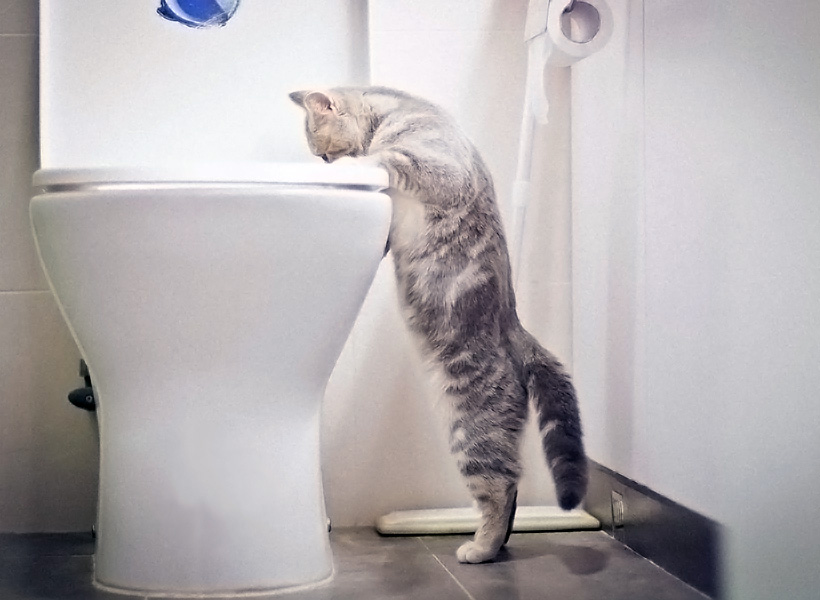Prevent Plumbing Problems: Never Flush Cat Poop Down Your Toilet - Professional Advice
Prevent Plumbing Problems: Never Flush Cat Poop Down Your Toilet - Professional Advice
Blog Article
Are you currently interested in facts concerning Can You Flush Cat Poop Down The Toilet??

Introduction
As pet cat proprietors, it's essential to bear in mind just how we deal with our feline buddies' waste. While it may appear convenient to flush feline poop down the commode, this technique can have detrimental repercussions for both the setting and human wellness.
Alternatives to Flushing
Fortunately, there are much safer and more liable methods to take care of feline poop. Consider the following alternatives:
1. Scoop and Dispose in Trash
The most common approach of getting rid of feline poop is to scoop it into a naturally degradable bag and throw it in the trash. Make sure to utilize a committed litter scoop and deal with the waste without delay.
2. Use Biodegradable Litter
Select eco-friendly cat clutter made from materials such as corn or wheat. These trashes are eco-friendly and can be securely dealt with in the garbage.
3. Hide in the Yard
If you have a yard, think about burying feline waste in a designated location far from veggie gardens and water sources. Make sure to dig deep sufficient to prevent contamination of groundwater.
4. Mount a Pet Waste Disposal System
Purchase a pet waste disposal system especially made for cat waste. These systems utilize enzymes to break down the waste, lowering smell and ecological influence.
Health Risks
Along with environmental worries, purging cat waste can also present wellness threats to people. Pet cat feces may consist of Toxoplasma gondii, a bloodsucker that can cause toxoplasmosis-- a potentially severe ailment, especially for expecting females and people with damaged immune systems.
Environmental Impact
Purging pet cat poop presents unsafe pathogens and parasites into the water supply, posing a significant risk to water ecosystems. These impurities can adversely affect marine life and concession water high quality.
Conclusion
Liable pet possession extends beyond supplying food and sanctuary-- it additionally entails appropriate waste administration. By avoiding purging pet cat poop down the toilet and selecting alternate disposal methods, we can lessen our environmental footprint and secure human wellness.
Why Can’t I Flush Cat Poop?
It Spreads a Parasite
Cats are frequently infected with a parasite called toxoplasma gondii. The parasite causes an infection called toxoplasmosis. It is usually harmless to cats. The parasite only uses cat poop as a host for its eggs. Otherwise, the cat’s immune system usually keeps the infection at low enough levels to maintain its own health. But it does not stop the develop of eggs. These eggs are tiny and surprisingly tough. They may survive for a year before they begin to grow. But that’s the problem.
Our wastewater system is not designed to deal with toxoplasmosis eggs. Instead, most eggs will flush from your toilet into sewers and wastewater management plants. After the sewage is treated for many other harmful things in it, it is typically released into local rivers, lakes, or oceans. Here, the toxoplasmosis eggs can find new hosts, including starfish, crabs, otters, and many other wildlife. For many, this is a significant risk to their health. Toxoplasmosis can also end up infecting water sources that are important for agriculture, which means our deer, pigs, and sheep can get infected too.
Is There Risk to Humans?
There can be a risk to human life from flushing cat poop down the toilet. If you do so, the parasites from your cat’s poop can end up in shellfish, game animals, or livestock. If this meat is then served raw or undercooked, the people who eat it can get sick.
In fact, according to the CDC, 40 million people in the United States are infected with toxoplasma gondii. They get it from exposure to infected seafood, or from some kind of cat poop contamination, like drinking from a stream that is contaminated or touching anything that has come into contact with cat poop. That includes just cleaning a cat litter box.
Most people who get infected with these parasites will not develop any symptoms. However, for pregnant women or for those with compromised immune systems, the parasite can cause severe health problems.
How to Handle Cat Poop
The best way to handle cat poop is actually to clean the box more often. The eggs that the parasite sheds will not become active until one to five days after the cat poops. That means that if you clean daily, you’re much less likely to come into direct contact with infectious eggs.
That said, always dispose of cat poop in the garbage and not down the toilet. Wash your hands before and after you clean the litter box, and bring the bag of poop right outside to your garbage bins.
https://trenchlesssolutionsusa.com/why-cant-i-flush-cat-poop/

I recently found that content about Don’t flush cat feces down the toilet when doing a search on the search engines. Sharing is nice. You won't know, you may very well be doing someone a favor. Thanks a lot for taking the time to read it.
Details Report this page